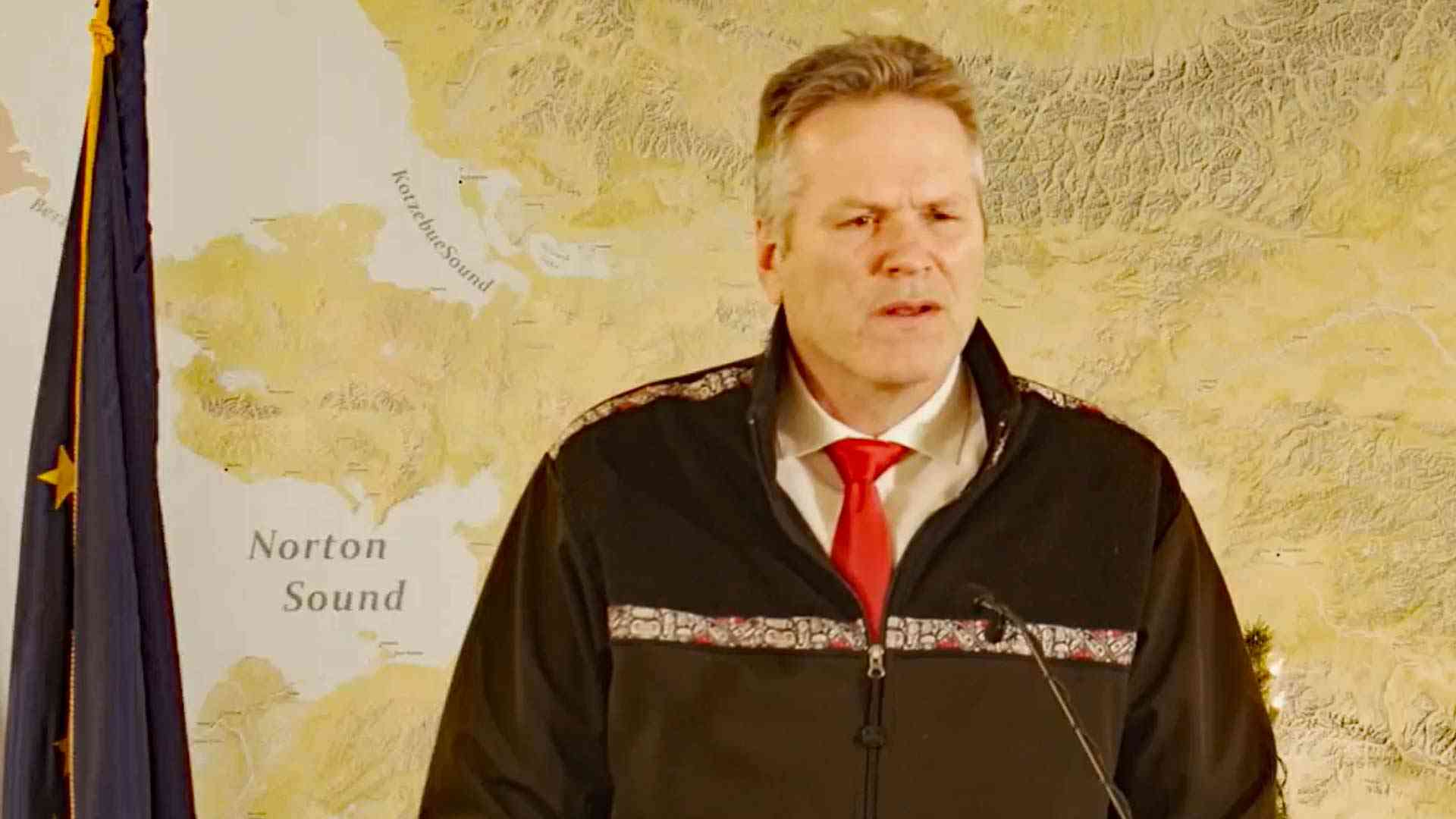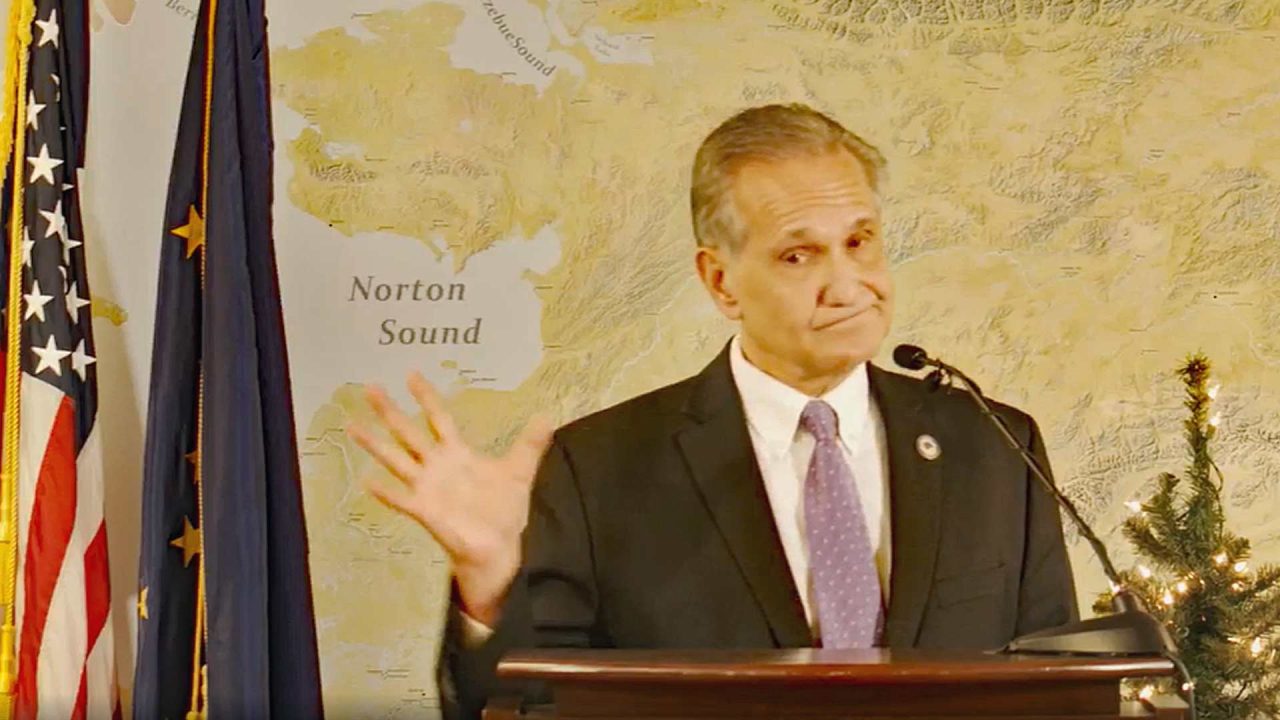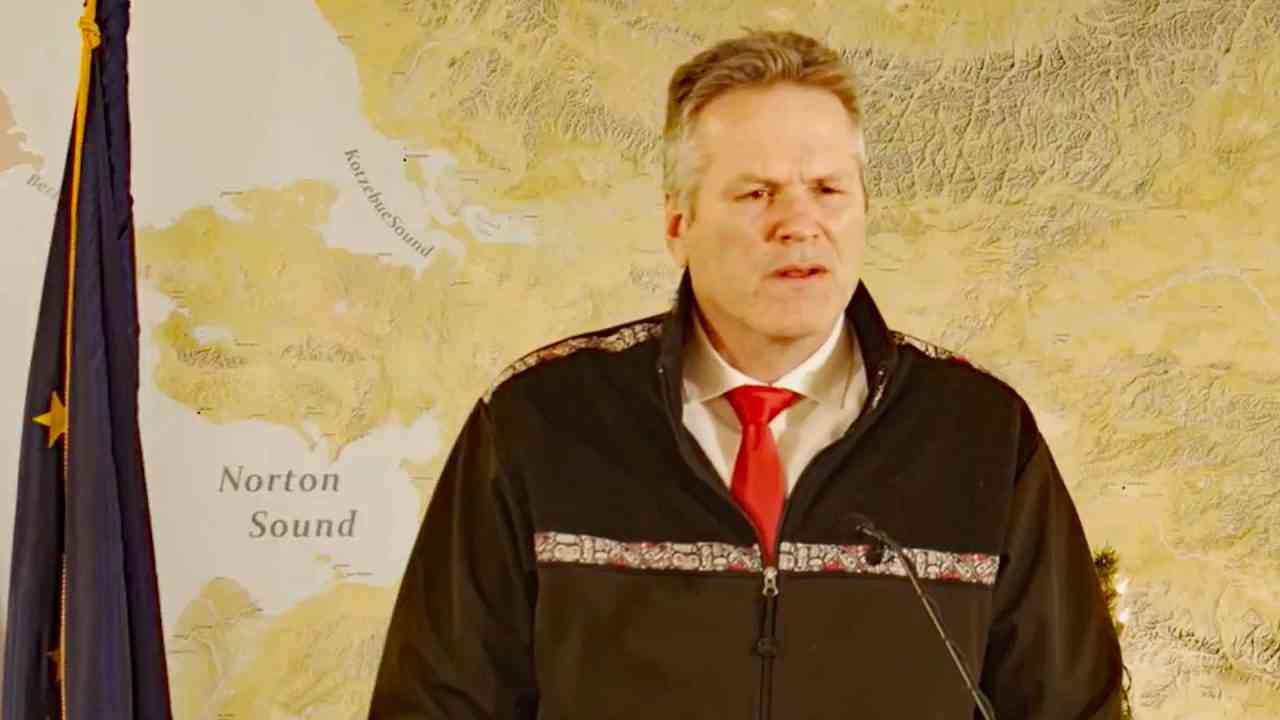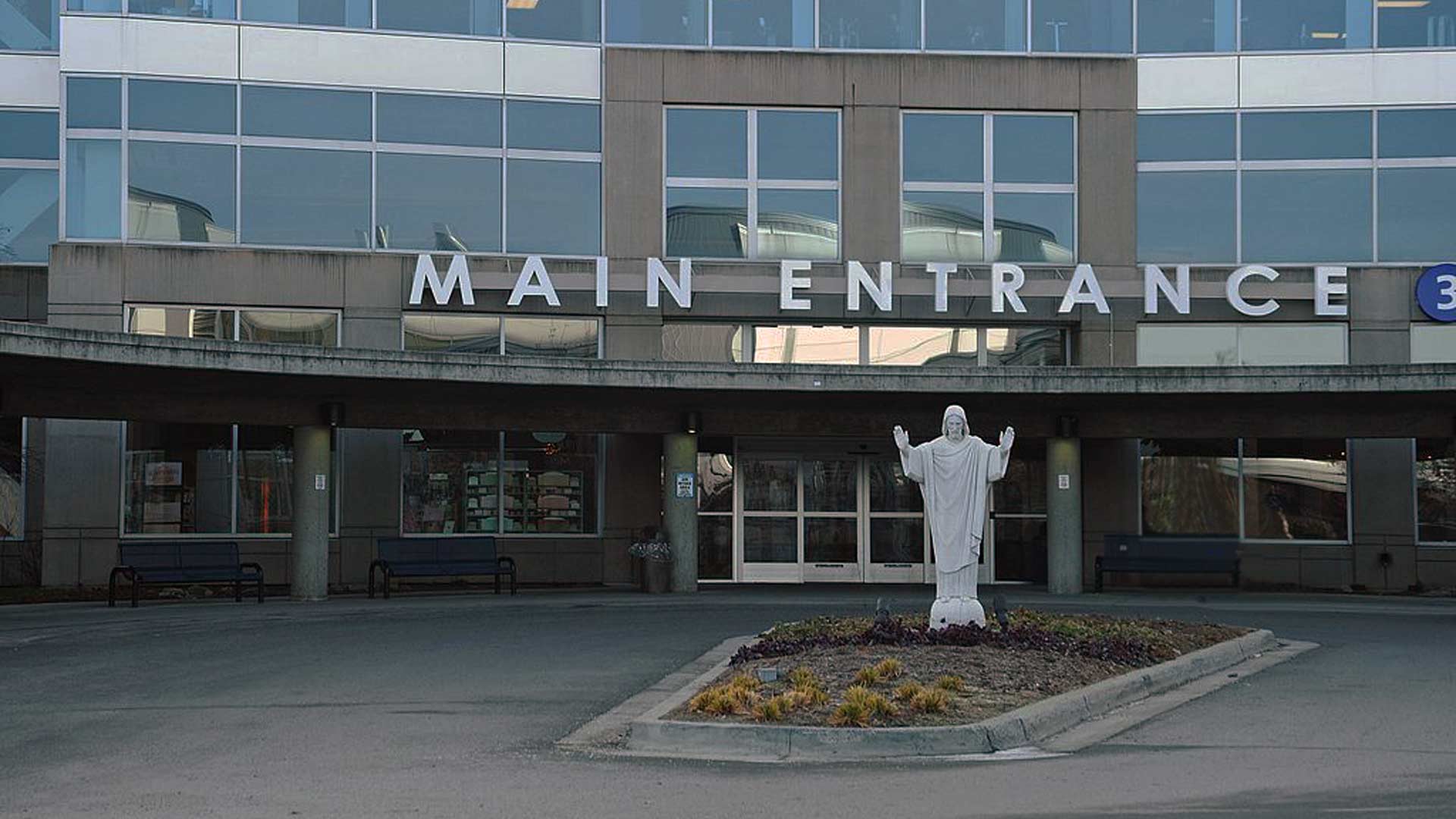
To address widespread concerns over election integrity and voter fraud, Gov. Mike Dunleavy and Lt. Gov. Kevin Meyer announced, Dec. 28, a sweeping election reform bill to be introduced in the upcoming Legislative Session, starting Jan. 18.

Dunleavy noted that nearly 20 election bills were introduced in the last session but none of them passed. The new bill incorporates many aspects of these other measures, including many by Sen. Mike Shower.
“There have always been concerns about election integrity – no matter where you are, what state you’re in, what city,” the governor said. “This past year we know there has been a lot of discussion about it. And we just want to be sure as we move forward in Alaska that a lot of those concerns, those worries are taken care of in the bill that is going to be introduced.”
Dunleavy said legislators need to act on the bill quickly as the 2022 elections are now less than a year away.
“We can’t wait any longer,” he said.
Lt. Gov. Meyer agreed. After speaking about areas of improvement which he hopes the bill fixes, Meyers announced that he will not run for re-election in 2022 in order to ensure faith that he is addressing election integrity without any ulterior political motivations.
The bottom line: We need to improve our elections.
Meyer noted that the 2020 election was marked by multiple challenges associated with COVID. This included widespread absentee voting, difficulties finding places where people could vote, and dealing with lawsuits and recounts in the wake of the results.
He observed that absentee voters comprised 50% of all ballots, a massive increase from the typical 20%. Ensuring the integrity of these absentee votes was hampered, when the Alaska Supreme Court threw out the witness verification requirement due to concerns that voters would not be able to find a witness to verify their absentee vote.
Adding to fraud concerns is the fact that shortly before 2020 election the Alaska Division of Elections Online Voter Registration System was hacked, exposing the personal information of 113,000 potential voters – data which could be used to fraudulently request someone else’s ballot.
Meyer acknowledged that he heard from many Alaskans who wanted to know how the controversial ranked-choice voting initiative passed when it was clearly losing on election night.
Meyer said it was due to absentee votes which came in later.
“A lot of elections changed,” he said.
Additionally, he said there was a lot of talk that “you can’t trust elections. Elections are full of fraud.”
“You’ve all heard, why do we have more people registered to vote than who actually live up here?” Meyer said.
Meyer expects this skepticism will continue in 2022.
“We need to be prepared, and Alaskans need to feel sure that, and know that our elections are conducted fairly and according to state and federal law,” he said. “The bottom line: We need to improve our elections.”
Some of the main points the proposed bill addresses include changing the current process by which Alaskans are automatically registered to vote when they apply for their annual permanent fund dividend check.
“One of the things that’s a little bit of an embarrassment, but I don’t know how to deal with it, is that people who have signed up for a PFD automatically get registered to vote, and some of these people don’t want to vote,” Meyer said. “They didn’t want to be registered to vote, but they wanted to get their PFD. And then when they move out of state, they stay on our voter registration list until finally they tell us they don’t want to be on that list anymore.”
He added that state law mandates that people remain on the voter rolls even after they depart Alaska so long as they “intend” to return. This creates a scenario in which Alaska’s voter rolls are bloated with people who have moved to other states without ever contacting the Division of Elections.
The bill creates newly defined offenses and mandates that police officers be trained on how to investigate election fraud.
“You’ve all heard, why do we have more people registered to vote than who actually live up here?” Meyer said. “So, that’s an area we want to work on.”
The bill also expands the number of election observers and sets up a toll-free election offense hotline. Additionally, it allows the Division of Elections to hand recount more than just one precinct in each district to verify voting machine accuracy.
The bill calls for signature verification machines and software that allows officials greater capacity to check signatures on absentee ballots, and it creates a free ballot tracking system while improving options for voters to cure their ballots if they are rejected for various reasons.
Chain of custody is another aspect the bill deals with by improving the capacity to track voting machines throughout the state.
To clamp down on election crimes, the bill creates newly defined offenses and mandates that police officers be trained on how to investigate election fraud.
ALASKA WATCHMAN DIRECT TO YOUR INBOX
Meyer defended the state’s decision to purchase and utilize Dominion voting tabulators, claiming there were “many checks and balances” in place to ensure their accuracy. He claimed that hand counting one precinct in each election district ensured the integrity of the vote.
“There’s been a lot of misinformation about these tabulators,” he said. “They are not hooked up to the internet in any way. They’re thoroughly tested when they are deployed, and they’re tested again when they come back.”
He did not, however, discuss whether the machines have the capacity to be hooked up to the internet, or how citizens can be assured that this won’t and did not occur.
Instead, he focused on the accuracy of the machines, noting that state hand counts of various precincts always match the Dominion results.
While the bill does not address cyber-attacks on state data, Meyer said this issue is being tackled by private contractors, as well as the U.S. Department of Homeland Security.
The bill won’t be available for the public to view until Jan. 18.








17 Comments
CAUGHT IN THE COOKIE JAR… DOMINION HANGS THEM ALL.
Mike Lindel of “MyPillow” has produced a 2 hour video on how Dominion reaches everywhere and key people deny that Dominion cannot and is not doing anything. Where is the proof? On Lindel there were experts tracking Dominion ability even to reach Alaska and alter the algorithms. When Kevin Meyer was approached initially he denied any problems with voter integrity in Alaska. There are legislators in office and obstructing progress who have been funded by Soros money through foundations, and they have cheated successfully. Three of those are from the Interior delegation are Scott Kawasaki, Grier Hopkins, and Adam Wool. We have watched them cheat their way into office and nothing has been done about it. Dominion machines need to be banished from the voting process and ballot harvesting outlawed. There are too many loose ends. Another problem that was mentioned at an AMAC meeting here in the Interior is that their relatives who have died are still voting. Tshibaka suggested a simple ballot measure that dead people are not allowed to vote should be submitted and voted on by “We the People.” Uncle Urban Rahoi died this past fall and he will be voting because they said he will not be removed from the register until 4 years have gone by. Note: I read that in Anchorage a voting precinct was moved so that people could not find where to vote and a good legislator lost by a small margin..
Excellent informative write, TY Ruth…. Patriot
Well said Ruth
The “tech tyrants” refused to play his video which exposes the most massive voter fraud in U.S. History during the 2020 Election.
As did the Governor when he stated Dominion would not be investigated in this State. whatcha afraid of Gov?
Do the research and one will quickly find out what Dominion is all about after learning of that knowledge it is easy to conclude that ANY electronic machine that has the capability of being hooked up to the e-net can be used to cheat. So easy that junior high students HAVE done it just to show how easy it is. That being said if someone has told you or is telling you that here is no cheating in elections are lying to you.
Get rid of the electronics and go back to hand count is the only way to get to the fairest elections.
Exactly MB,,, They know we know they know. This is political damage control to assuage our wrath when. the
truth is revealed to the sleeping masses, Real eyes, Realize, Real Lies.
The big question is yes you may not see a physical attachment (i.e. Hardwired) into an Ethernet port but the technology in wireless is capable of being on the www. domain. Everyone walks around today with a mini computer in their pocket capable of processing copious amounts of data at very fast speeds. The only way to counteract this is to go back to all paper ballot system to boost the election security. The caveat to this is physical presence from both side to observe the process and to ensure complete integrity to our voting rights. Continued use of electronic technology will further degraded the fair and balance election system that was once the envy of the Free world.
Paper Ballots in person only with MASSIVE Non partisan citizen surveillance, NO MACHINES, and NO RANK CHOICE BS is the ONLY WAY FORWARD to a FAIR ELECTION. Those who cheated or knowingly covered it up in 2020 NEED TO BE PROSECUTED to the full extent of the law and if that doesn’t work because of a crooked bought off justice system, MILITARY TRIBUNALS! THEY CHEATED. PERIOD.
Paper ballots only. There is no rush, we can count by hand as winners are not put into office for 2 months. Many bad actors are skewing the peoples valid votes. I have been trying to see if my vote counted, state site isn’t clear as me having voted. For last several elections I have initialed my ballot before inserting into machine. Hoping it can be tracked and verified if necessary.
Google LtCol Senator Wendy Rogers Arizona if. you want to see a Constitutional Patriot Defend her Oath
and Republic against what these in our state govt have allowed the Foreign. entities to do with. the treasonous Dominion
evil. Dominion as installed one month prior to the 2020. Presidential Election in our State. Mark Zuckerberg paid Nationally $800 million bucks to State. officials to make sure their plan went smooth. We have been served a steaming hot. plate of TREASON and the John Durham Probe and investigation has Thousands of sealed Indictments yet. to be opened with many in this corrupt State Govt. Get Ready….
I was part of the group that brought all the discrepancies before the governor and the lt. governor in July of 2020. They promised us that anyone wanting a hand count could have one no matter the margin of victory. They also promised to buy machines that could not be accessible by the internet. Now these two liars are going to fix what they overlooked for two years before the 2020 election. If the other bills didn’t pass, what makes these two wizards believe that their bill will pass the same group of lawmakers. Many of whom won due to illegal absentee votes. The director of elections in a senate hearing admitted every absentee vote lacked a chain of custody, therefore not one absentee vote was legal. One last nitpick, the percentage of absentee votes was 37.5% not 50%. These two should do a remake of DUMB and DUMBER.
No machines!! The machines do have the capability of being connected to the internet. I do not trust our elections anymore. I don’t trust our politicians. They are being bought off!! Paper ballots only!! Also, we need a full forensic audit of the election. Fix the fraud election first!! I do not believe we passed rank voting!!
One frauds resignation, one to go
This “sweeping election integrity bill “ proposed by these two idiots is a clear case of dammit we got caught!! Now we have to create a bill to get the people off our back. When you get caught being bad you are punished in the real world. In dunleavy’s world you simply “move forward “ by proposing bs that sounds nice?!!? I.e. the police need to be involved, after all Myer looks tired after blundering his two job responsibilities. One: sit on the seal, keep it warm with your worthless behind! Two: oversee a legal, fair election and cleanup the election rolls. Has anyone checked to see if the seal is warm? Obviously the given response from the governor and Lt governor admits that 2020 election was run by buffoons and for some unknown reason we’re not going back and do a forensic audit like the people have demanded, no we’re going forward in dunleavy’s words to put the responsibility onto police who apparently don’t have enough to do. One look at Myer and it’s plain to see his next stop will be checking in to his room at the old folkie home.
We the people of this state are fed up with this crap that is designed to give us more special sessions than you can shake a stick at!! Dunleavy needs to go !Now!
They know their time is short hence the Dunleavy snuggling up to Trump. I really dont think he would have disowned Murky that. fast
unless looking. for an easing of what. is coming. And Meyers trying to slide out the back door and retire is pretty telling also. All our PFD inf
stolen under his nose I would run too if I was he.
Saving America starts by saving the GOP from RINOs, (Republican in Name Only – liberal beliefs) from sellouts, and from “known LOSERS!”